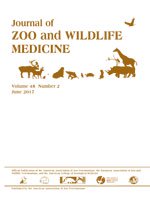A 14-yr- old, male harbor seal (Phoca vitulina) presented with depression, anorexia, and weight loss. Clinical examination revealed no specific abnormalities. Diagnostic imaging displayed an enlarged mass in the dorso-cranial abdomen. The animal was euthanized due to progressive worsening of symptoms. Grossly, severe emaciation and a massive enlargement of one mesenteric lymph node were found. Microscopically, a neoplastic round cell population with morphologic characteristics of mature lymphocytes infiltrated the mesenteric lymph node as well as the jejunal mucosa and exhibited a marked invasion of the mucosal epithelial layer. Immunohistochemically, the majority of cells expressed CD3, but not CD79α, indicating a T-cell origin of the tumor cells. Microscopic as well as immunohistochemical findings enabled the diagnosis of an epitheliotropic intestinal T-cell lymphoma, a neoplasm that has yet not been described in a harbor seal.
How to translate text using browser tools
1 June 2017
EPITHELIOTROPIC INTESTINAL T-CELL LYMPHOMA IN A HARBOR SEAL (PHOCA VITULINA)
Sara Malberg,
Henrike Alma Gregersen,
Manfred Henrich,
Christiane Herden
ACCESS THE FULL ARTICLE
Epitheliotropic lymphoma
harbor seal (Phoca vitulina)
intestinal T-cell lymphoma
intestinal tract
neoplasia
pinnipeds





